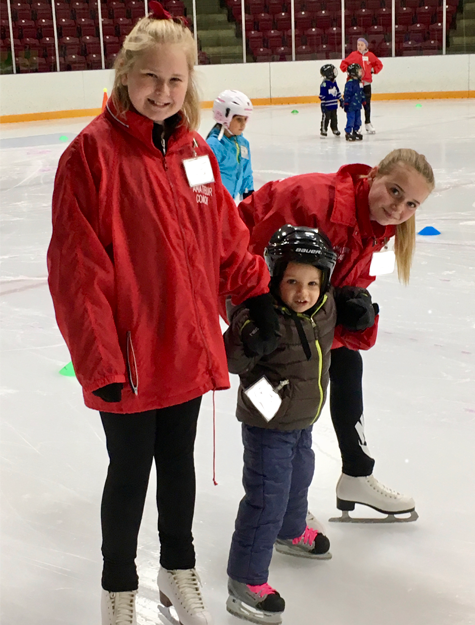New Skater Guide
New to skating? Here are some tips to get you ready for the ice and your first few weeks of skating at the Cambridge Skating Club...
BEFORE THE PROGRAM BEGINS
- Please be on the look out for a Group Lesson Newsletter in your email that contains specific information about the session you are signed up for. It will be sent out the week before programs begin.
- If you do not receive the newsletter, please email our office. If you have OPTED OUT of emails, you will not receive ANY information about programs during the course of the session. We highly encourage you to OPT IN to receiving emails so that you can stay informed about program changes, club events, etc. We do not make phone calls if you opt out.
- If you have specific questions, please email our office at: cambridgeskatingclub@gmail.com
HOW TO PREPARE FOR THE RINK
- A proper fitted CSA approved hockey helmet is mandatory for all participants. A face mask or shield is optional, but recommended.
- Hats worn under helmets must fit snugly so they do not slide down into the skaters face.
- Long hair must be tied back and/or pinned off the face so that the skater can see where they are going. It is a safety hazard to have hair covering the eyes.
- All skaters should wear warm fleece or wool gloves/mittens. Slippery mitten fabric, such as nylon, will hinder a skater when trying to stand up.
- We highly recommend that adult skaters wear wrist guards.
- Warm layers of clothing should be worn that will provide ease of movement. Splash pants should be worn instead of snow pants. Snow pants are very bulky and often restrict a skaters movement.
- Skates must be properly sized, sharpened and tied snugly. The skaters' heel should sit flat and toes should not touch the end of the skate. A little bit of space to wiggle their toes is important. Wear only one pair of socks that go above the top of the skate. Once skates are laced, have your skater stand to ensure their ankles are well supported. The blade should stand perfectly upright when the skater stands up. If their ankles are not straight and there is not enough support, please look for better quality skates. They can practice walking with skate guards at home before coming to the rink.
- Have skate guards and a cloth for wiping the blades dry after skating. Use a soft fabric blade protector or dry towel to protect the blades when not skating. (see skate care in our newsletter)
- Sharpen skate blades regularly by a professional sharpener.(every 25-30 hours of skating)
- Watch this Youtube video on Proper Equipment for CANSKATE from Skate Canada.
CSA APPROVED HELMETS
-
Bike, ski, equestrian, motocross and all other helmets are NOT allowed on the ice. Skaters must have a CSA approved hockey helmet.
WHAT TO EXPECT ON YOUR FIRST SESSION
- The first day is all about getting familiar with the coaches, program assistants, the rink and how the program runs. Skaters will be pre-grouped before arrival on the first day, and then could be re-assigned to a different group over the course of the session.
- Please arrive at least 20 minutes early to pick up your name tag, get skates and helmet on and listen to the Parent Orientation meeting. Name tags must be worn on every session.
- Our Program Assistants and Skate Canada Certified professional coaches will be on the ice to assist the skaters. Parents are NOT allowed on the ice for any reason except in the Parent & Tot program.
- Skating lessons are a fun way for young children to learn skating skills and overcome challenges. Some skaters are comfortable right away, and for some skaters, it may take some time to feel comfortable on the ice. Expect that it might take your child a few weeks to adapt to being on the ice without you and to find their feet. Be patient, as every child progresses at their own pace. To increase your skaters' comfort, you could take advantage of family public skates so that parents and siblings can assist them in a relaxed and fun environment.
ABOUT OUR COACHING TEAM
-
Our coaches are registered professional coaching members of Skate Canada who are trained and certified in the National Coaching Certification Program (NCCP).
- Program Assistants are current and former skaters that have been trained to assist skaters in the Canskate Program. They can be identified by their red jackets.


